


This summary for Game Two was written by Eauxps I. Fourgott. Many thanks for volunteering to put this report together! 
Game 2 featured a wide variety of leaders, but the most focus going in was on the two seeded leaders, in particular Pool One leader and reigning champion Mansa Musa. The best pure economic AI in the game had an intriguing starting position in the northeast, fairly isolated and out-of-the-way but with mediocre land, and most of the pregame discussion revolved around either why he was going to win, or why he wasn't. Perhaps the most danger to Mansa would come from his western neighbor, Pool Two leader Suryavarman, who had a nice-looking starting position, good expansion prospects, and a likely good neighbor to the west in Hannibal. Of those who didn't back Mansa to win, a large majority backed Sury instead, and it seemed likely this game would come down one of these two reigning supreme. Other leaders here included important swing players Bismarck and Suleiman, who both had middling peace weights and central starting positions on the south of the map. Their intervention could easily prove critical in deciding who came out on top. Finally, in the southern corners of the map were Lincoln and Augustus Caesar, both of whom would be disposed to try to sit back and build peacefully, while the northwest corner held Hannibal, who was considerably more likely to try and fight his way out of his corner.

As the leaders settled their initial cities and researched their initial techs, it quickly became clear that quarters would be cramped in the west. Lincoln, Hannibal, and Suleiman all sent their second settlers towards the space between the three, while Suryavarman planted his second city due west, by Hannibal. To make matters worse, Hannibal and Sury ended up founding the game's first two religions, Taoism for Carthage and Buddhism for the Khmer, adding a bunch of cultural pressure to this region and threatening to poison relations between the two leaders. A little later, Suleiman founded the game's third religion in Islam, further driving a wedge between the three lower peaceweights and keeping religion out of the east of the map for the time being.
That left more space to the east, where Mansa was out to a roaring start. There had been concern about his starting location, as it had quite a few food resources, but ones that he couldn't improve right away in clams and wheat. But Mansa's first two techs researched were Fishing and Agriculture, and he quickly converted his capital into a food powerhouse. That helped him to also lead the early settling race, the first leader to five cities with quite a bit of space still to fill. The only major flaw in Mansa's early gameplay was a failure to put culture of any kind in his cities, as he unusually skipped Mysticism for a very long time and his capital was still the only city with expanded borders as late as Turn 80!
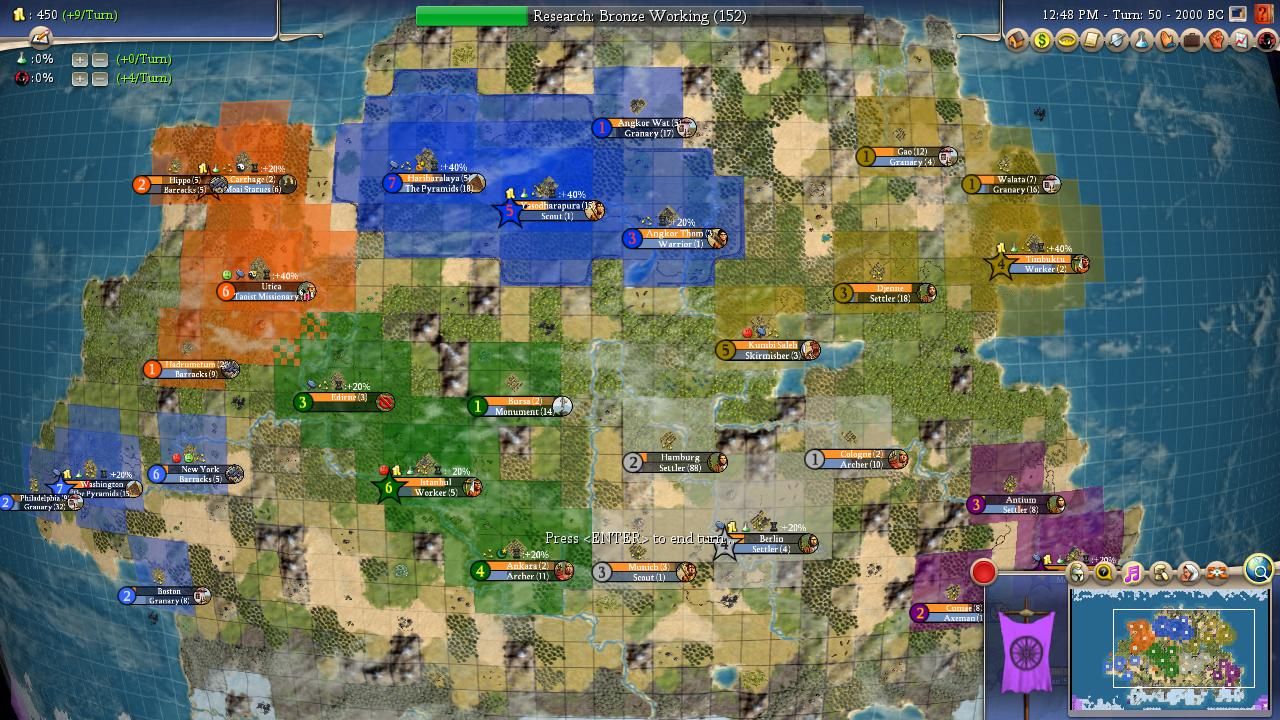
While Mansa was building wide, Suryavarman was building more tall to start with. His Holy City had grabbed stone as well, and he converted that into a number of early wonders, landing both Stonehenge and the Great Wall at very early dates. This focus on wonders set him slightly behind in expansion early on, as he was the last leader to found his third, then his fourth city, but he still had room to move and his Creative + Stonehenge + early religion combo made his culture absolutely dominant wherever he went. He had a low number of cities for now, but they were very high quality. To his west, Hannibal was tightly squeezed and didn't have room for very many cities at all. He was trying to make the best of it though, and managed to send a settler far south to take a site located between Lincoln and Suleiman, right outside Istanbul. Suleiman never should have let him have that spot, but he was expanding very slowly here despite his Imperialistic trait. He and Lincoln had become the laggards of the landgrab, both sitting at just four cities when everybody else had five or more. The good news for Suleiman was that he was the early GNP leader, taking advantage of the choice land where he did settle. Lincoln had no such advantage, didn't even have so much as culture or metals early on, and was the clear runt of the litter. A lot of people had picked him as First to Die, and were surely happy with this state of events.
Over eastwards, Augustus had the early lead in city count, but his cities were all fairly close together, not claiming a ton of land, and like Mansa and Lincoln, he had made no moves towards early culture. That left him with only a mediocre score despite his city count. Bismarck had played an average opening so far with nothing to comment on, but that all changed on Turn 64: he opened this game's hostilities with a war declaration on Suleiman! The German attack stack was a disorganized crew of six units, who predictably achieved nothing against the Ottoman defenses. Bis had actually chosen a savvy time to strike, as Suleiman had NO METALS within his cultural borders when he declared war, but he wasted this opportunity with shoddy tactics, and shortly afterwards the Ottoman borders expanded over iron, which was quickly connected to safely plunge this war into a stalemate instead. No cities would change hands during the war, but it still was a highly significant conflict, stalling the two central leaders out while everybody else built up. Neither Bismarck or Suleiman would get out past five cities while this war was raging; it was transforming them from potentially critical players into minor entities.
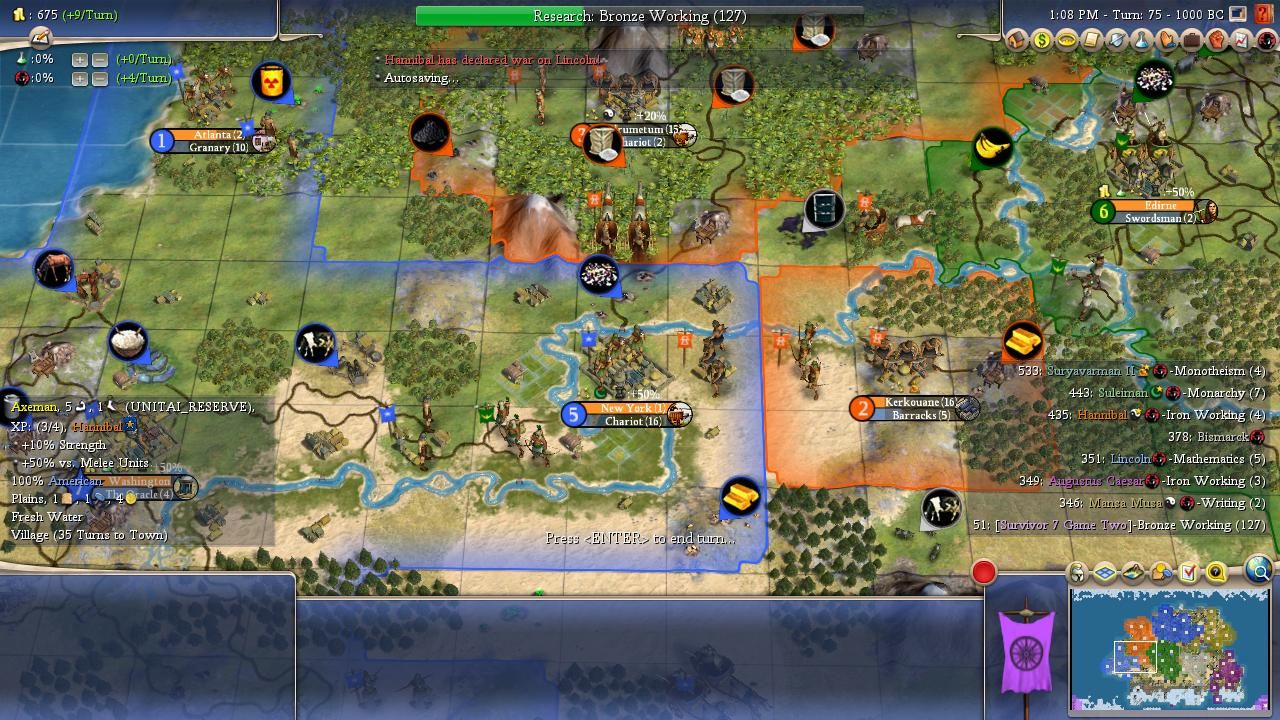
Meanwhile, in the west, Hannibal was soon ready to start fighting his way out of his cramped position, and declared war on Lincoln on Turn 75. Lincoln had made the same mistake as Suleiman and had no metals connected to start the war. He too was able to connect them quickly, but Hannibal's attack was better organized than Bismarck's had been, and Lincoln's defenses lighter. The border city of New York by all rights should have been a tough nut to crack, with Hannibal attacking it across a river with no catapults - but Lincoln had only garrisoned it with an archer, a chariot, and a warrior, and so it fell easily instead. At least Lincoln had metals, now - all he needed to do was use them to build some units, and he could still hang on! Er - what was this garrison in his capital? TWO ARCHERS and nothing else?!?!?  Washington too fell easily, and now the rout was on. The third city in line was Philadelphia, which blithely continued building The Great Lighthouse instead of, you know, defenders? It fell just as easily as the first two cities. Lincoln was folding far more easily than normal, and that was changing this game's entire outlook: rather than having to fight a long, tough war to expand, Hannibal was getting to double his empire's size virtually for free.
Washington too fell easily, and now the rout was on. The third city in line was Philadelphia, which blithely continued building The Great Lighthouse instead of, you know, defenders? It fell just as easily as the first two cities. Lincoln was folding far more easily than normal, and that was changing this game's entire outlook: rather than having to fight a long, tough war to expand, Hannibal was getting to double his empire's size virtually for free.
At the 100 turn mark, Hannibal was clearly on the rise while Lincoln seemed virtually guaranteed to die first unless something huge changed. Suleiman and Bismarck had signed peace by this point, but both were severely set back by their inconclusive war. Augustus had settled a bunch of tightly-packed cities, but they weren't contributing a whole lot yet and he didn't appear to have a major edge. The two seeded leaders remained the ones to watch; Suryavarman had rebounded after his slow start to get the highest city count on the map. He had also claimed a significant portion of the land between himself and Mansa, and with this successful expansion, all those wonders he had cleaned up on earlier had turned into pure profit. Sury had a large lead in score by this point, but didn't like anybody else as he was the world's only practitioner of Buddhism. Which direction he chose to strike would be hugely important to the outcome of this match. Meanwhile, Mansa had done a solid job of expansion himself, with the second-most cities. He'd been hampered early on by a lack of culture or happiness, but soon after finally getting out some monuments and libraries, he'd researched Calendar to open up the chance to hook up several happiness resources. By Turn 100 he was clearly on the upswing, and with a bit more time to develop he would become the true powerhouse we know him to be. All he needed was for Suryavarman to attack someone else first...
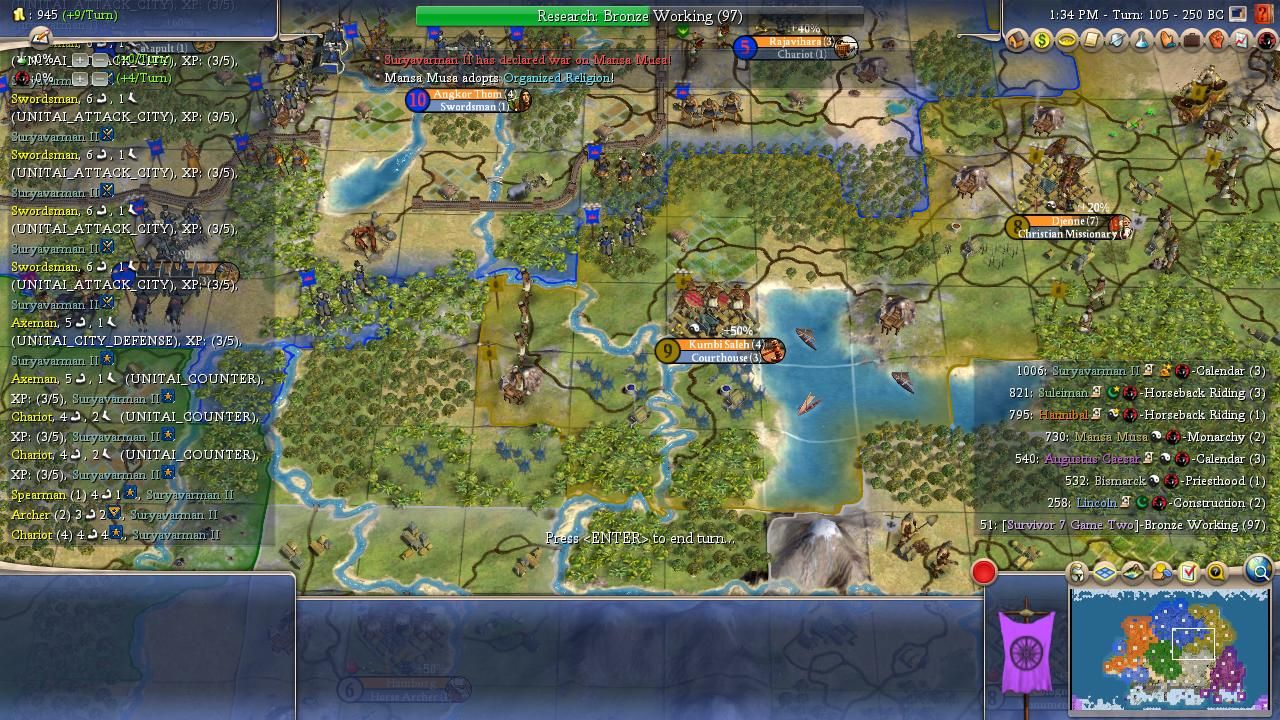
Mansa would get no such luck; he was indeed the target of Suryavarman's first war. Sury's attack stack was very large for this stage of the game, and took the first city it attacked without breaking a sweat. What Mansa really needed right now was for someone else to backstab Sury, plunge him into a two-front war and divert resources. But Suleiman had instead chosen to attack Hannibal, too weak to really threaten him but nevertheless stalling his conquest of America and ensuring no distractions would come from the west. Bismarck and Augustus remained passive, neither wanting to make a move. And so, when Sury's stack took a second city as easily as it had taken the first, it became clear that Mansa was doomed. He'd needed a bit more time to really get off and running, but Sury simply would not give him that time, and his own start had been fantastic to give him a decisive advantage. Now he had chosen the perfect war target; this attack was a clear turning point in the game, converting Sury's early lead to a long-term position of dominance.
Mansa would at least avoid being First to Die; that distinction instead went to Lincoln, once Hannibal signed a white peace with Suleiman. Lincoln's play this game had been inexcusably bad; he did have a rough starting position, but he surely could have put up a far better fight than he did, and with better play he could have even stalled Hannibal out long enough for Suleiman's attack to cripple Hannibal and allow the two to conquer him - that would have made for a very different game indeed! Instead it felt as though Lincoln didn't even bother trying this time, as he expanded poorly and then defended horribly to allow himself to easily be solo conquered. At least he ended up being important to this game, offering himself as an easy conquest to Hannibal and allowing him to become much stronger than he otherwise would have been.
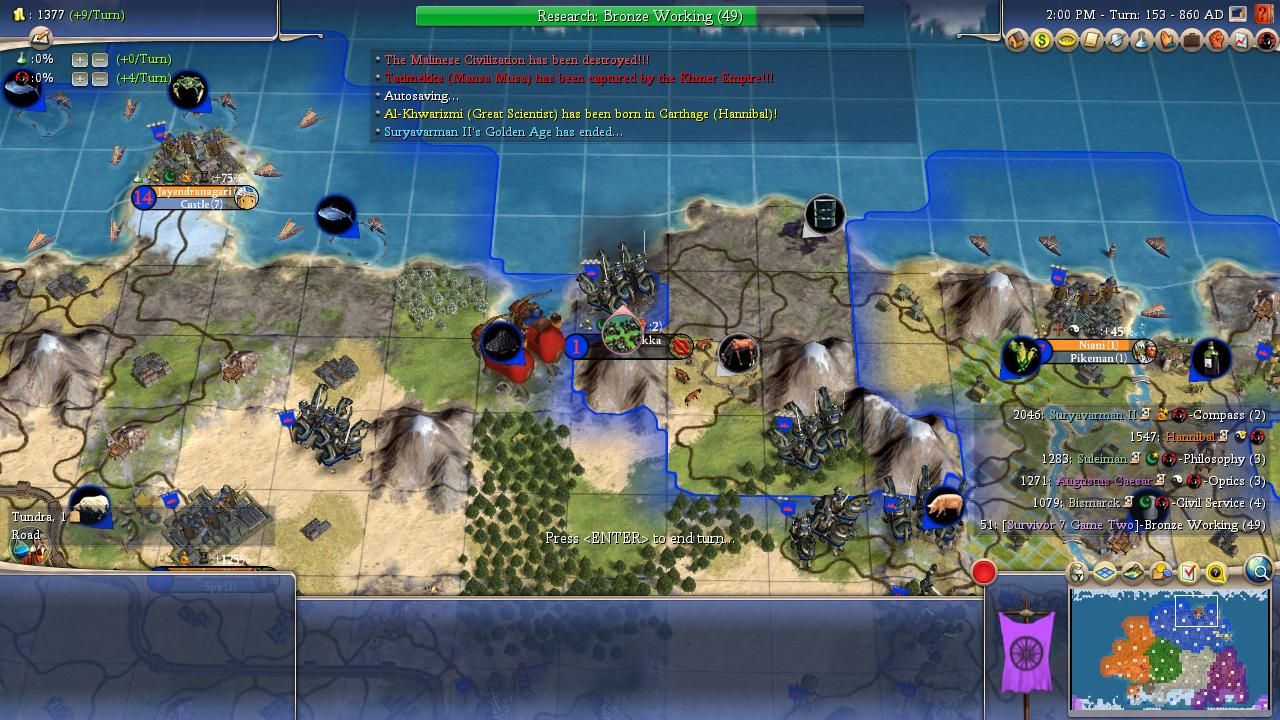
Meanwhile, Suryavarman's conquest of Mali had been brutally effective. Mansa was already down to just three cities at the time Lincoln died, and would himself last only 17 turns more. Unlike Lincoln, Mansa had played pretty well if not optimally. His start had been a bit slow, but he'd clearly been consolidating well, and if Sury had attacked anybody else, he would probably have had enough time to build up and become a strong contender for the win. Instead, Mansa got his worst-case scenario, plowed into by his only aggressive neighbor, who also happened to be the game leader. In this case, I don't think we can even fault him for poor defense; it would have taken a completely different gameplan for him to be able to stand up to Sury's assault, and even a pure military strategy might not have been enough. Sury's start was just that good. As a result, the reigning champion is now out of the tournament; Mansa won't be taking home a second trophy this year.
In the wake of Mansa's departure, Suryavarman was the clear game leader, controlling all of the land from the world's two biggest nations. This game was his to lose now, and he likely would have his choice of whom to knock out and whom to carry with him in second place. The only other leader with any sort of chance was Hannibal, who was in a clear second place and comparable in economy thanks to his Financial trait; he had an outside shot if he could take enough territory from the remaining leaders. While everybody else had been fighting, Augustus and Bismarck had turned their efforts to settling iceball cities in the southern tundra; while this would eventually prove to be unexpectedly impactful, it certainly wasn't doing anything to help them be competitive in the broader scheme of things, where they and Suleiman were all roughly comparable in the third place position. Of the three, Augustus had the biggest population base, and Suleiman had the best economy thanks to a few nice wonders and a very profitable Islamic shrine, but the fates of all three clearly rested with the top two leaders.
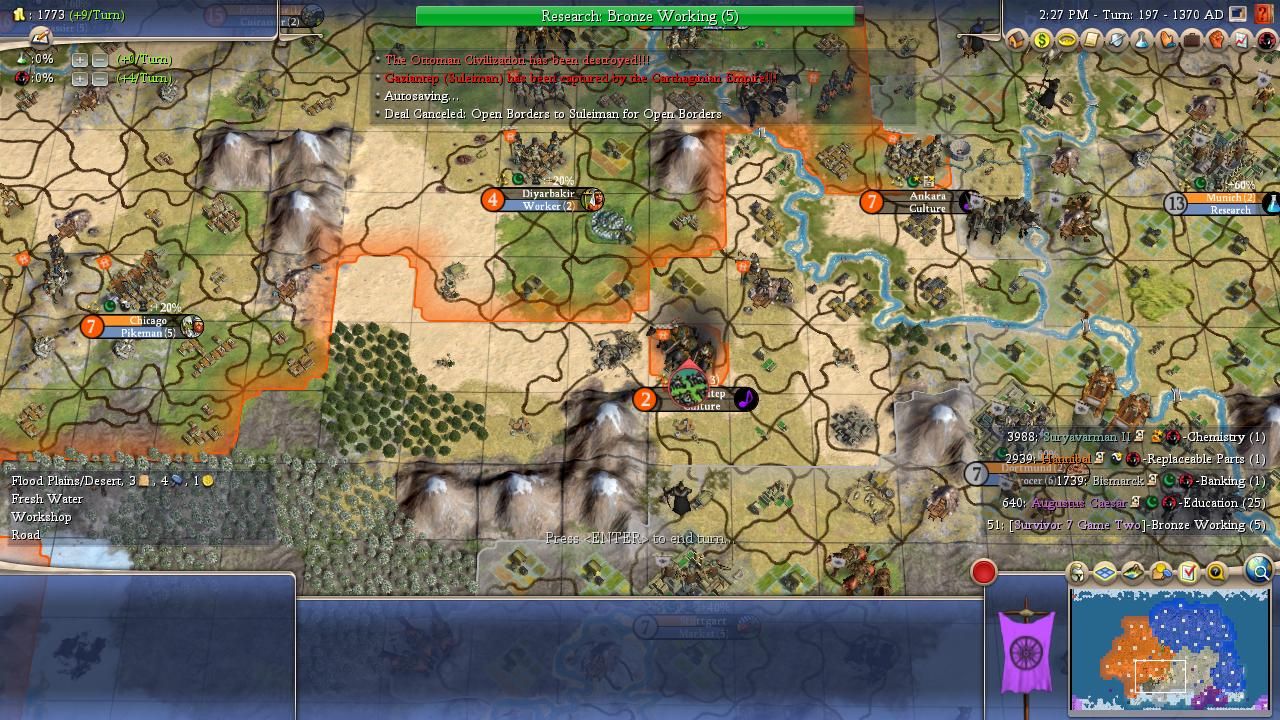
It wouldn't take long for more action to spring up. Having assumed dominant positions, Hannibal and Suryavarman were both eager to press their advantages and continue taking land, and so Hannibal soon attacked Suleiman while Sury declared war on Augustus. These wars were quick and ugly, with no illusions that the lesser leaders had a chance. They were easy pickings for the strong, and Suleiman was the first to run out of cities. The Ottoman leader had put out a weak performance, but for the most part it wasn't his fault. He was simply unfortunate enough to suffer an early attack by Bismarck that he couldn't do anything about, and that dragged him down enough that, especially in a game with two leaders that got off to much better starts, he had no path to victory from that point onwards. It was a disappointing turn of events for a leader who'd had a lot of promise going in.
Just a few turns later, Augustus's time was up... but what's this? Sury couldn't get to his final city?
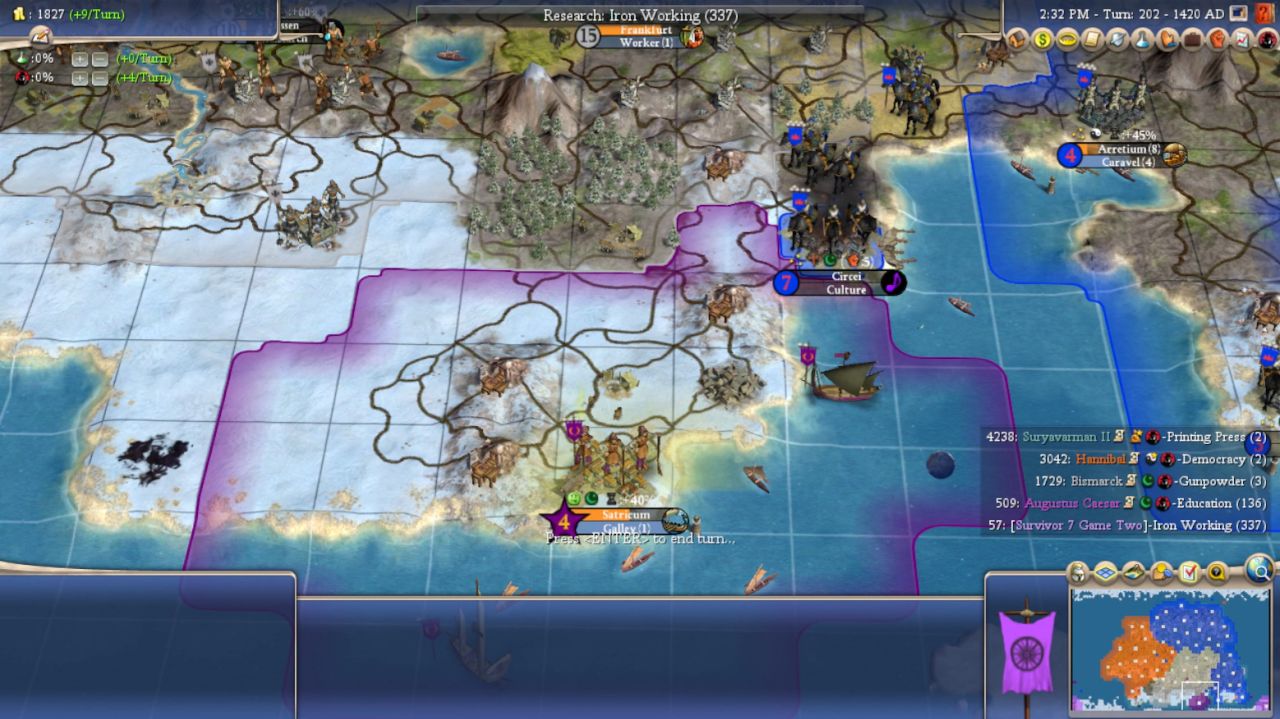
Indeed, one of Augustus's iceball cities from earlier in the game was protected on all sides by German culture. Bismarck liked Sury none too much and wouldn't sign Open Borders. Sury had a small stack in a neighboring city that he'd conquered, but without a path that his main army could take to the final city, the AI refused to press on with even this small stack. So the iceball city would prove Augustus's salvation, for now. Sury stalled out, his momentum completely halted as he continued churning out units that he wouldn't use. This development was great for Hannibal, leaving him free to act as he saw fit while his chief rival was stuck on pause. Suryavarman still had the bigger empire, but Hannibal and his Financial trait had pulled ahead in GNP, and he wasn't planning to just sit back. Neither of the game's two juggernauts cared much for Bismarck, and so it was no surprise when Carthaginian forces came crashing over the border.
Hannibal clearly had the superior army here and there was no question that he would ultimately win, but this conquest went a lot slower than his previous two. He'd brought the dreaded single trebuchet with his attack stack, causing the siege of Dortmund to drag out for ages and ages. With Augustus' final city still sealed off, this had the net effect of increasing Hannibal's tech lead over a Suryavarman who was continuing to stall as he stacked up endless troops. (Sury had over six hundred units at this point, his army over triple the size of Hannibal's, and despite his massive Deity unit support discounts, the maintenance on this mega-army was making itself felt, on top of Hannibal already having the better economy.) Eventually, though, Hannibal took the city, and that finally cleared a path through German culture to the iceball. Khmer units swarmed through the gap and Augustus was soon history, Bismarck having bought him about 50 turns alltold. The Khmer cavalry galloped all over the Antarctic in celebration while Hannibal continued slowly pushing through German territory, taking his time despite having a crushing tech edge by now. Finally, 20 turns later, he eliminated Bismarck as well.
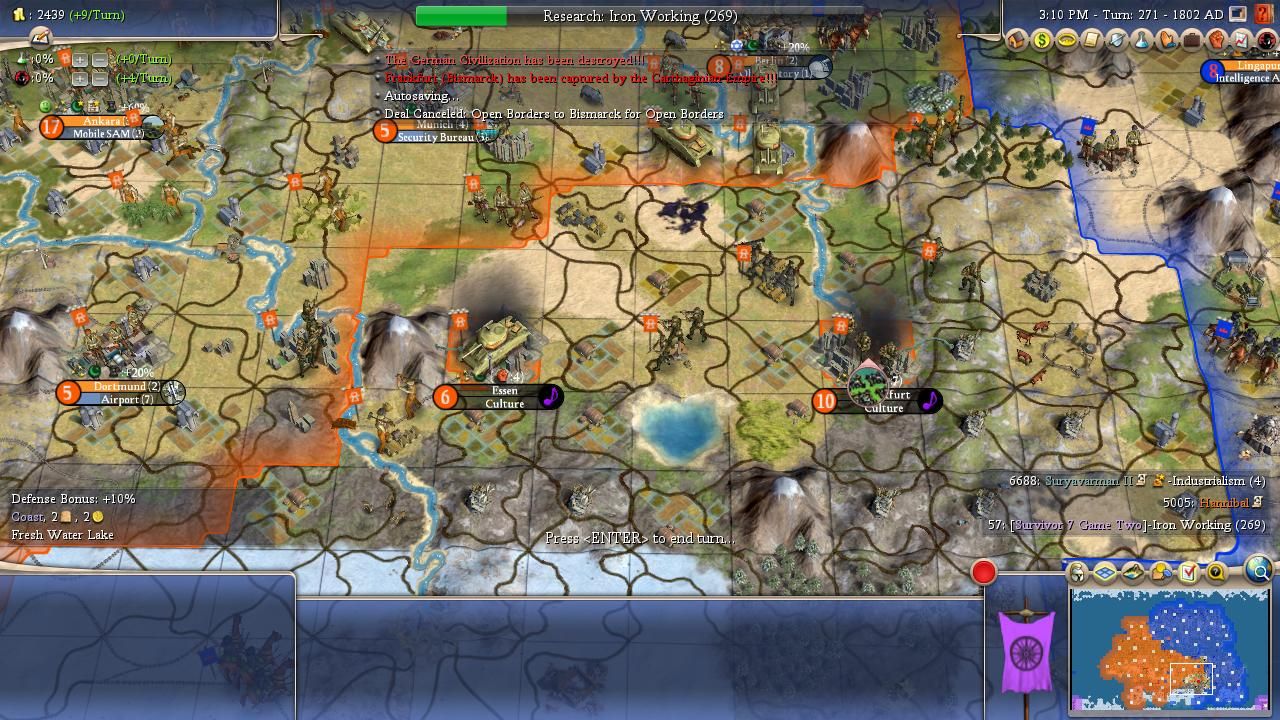
There isn't much to say about Augustus's performance in this game. He built a lot of cities, but failed to actually do anything with them, instead just sitting around until Sury wiped him out. Given the important events unfolding on the other side of the map, it might not have been possible for him to put himself in a winning position regardless - but he sure didn't try. As for Bismarck, he'd been the troll of this game, first attacking Suleiman to permanently knock him down a peg, then bodyblocking Sury from finishing off Augustus to completely halt his momentum. There was no sign of last season's breakout Bis in this game - he certainly didn't play well here and at no time was he in contention for the win - but he had proven a critically important player, taking the role of kingmaker for this match. And so we were down to the final two, two successful conquerors out of targets. In most games, either of these leaders would now be winning in a runaway, but instead they still had each other to contend with. By now Hannibal had a decisive economic edge, up by about 8 techs with the GNP lead as well, but Suryavarman's army was ginormous, and if they came to blows he might win out by sheer weight of numbers. Would we see a giant endgame battle for supremacy to settle the winner once and for all?
As it turned out, we wouldn't. Hannibal and Sury loved each other, their identical peaceweight helping them to become fast friends. Neither one would declare war on the other unless spy shenanigans caused relations to drop, and so to space it was. That meant this game would have an undramatic finish, as Hannibal would clearly win this space race. He even popped a golden age during this period, resulting in a research rate of over 4200 beakers per turn! The good news was that this insane research rate resulted in Hannibal quickly knocking out the entire tech tree rather than wasting a lot of time. He kept viewers guessing on the final end date, queuing his last spaceship part in a low-production city before swapping it elsewhere, and randomly launching the ship minus one thruster to add two extra turns to his victory. But victory it was, via Space Race on Turn 310. But that isn't all there is to the story of the endgame...
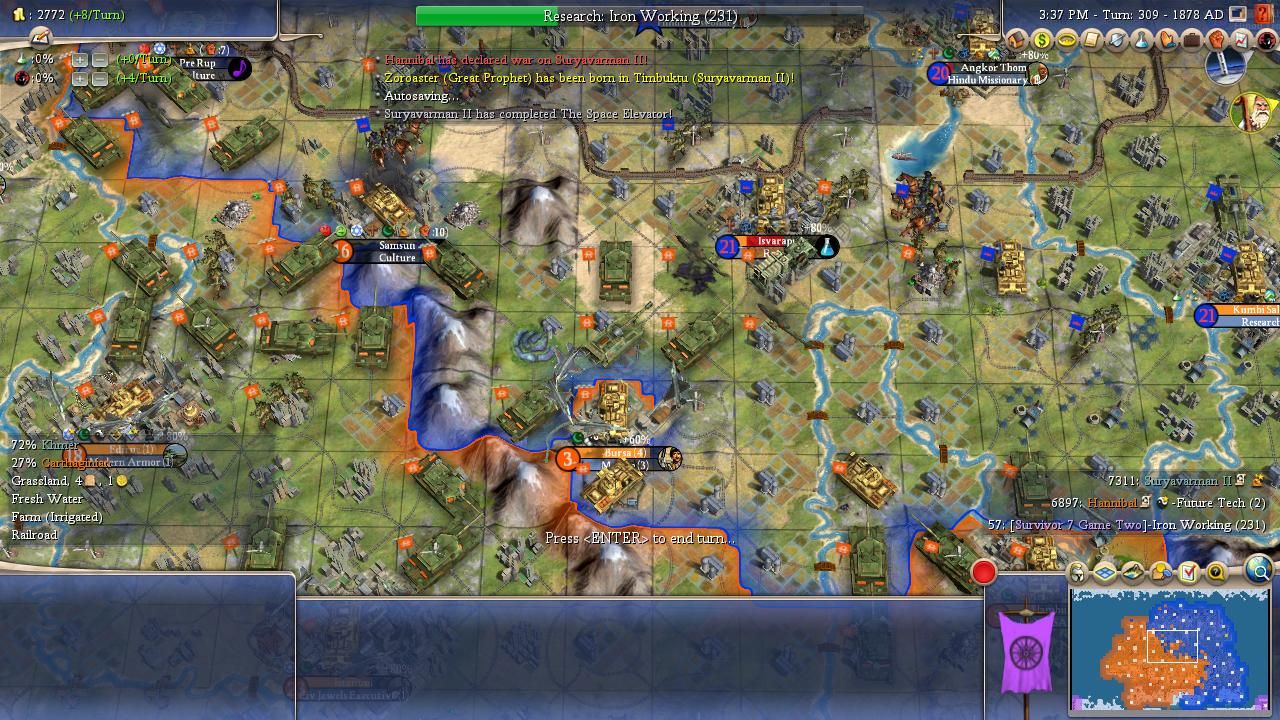
Just one turn before winning, Hannibal declared war on Suryavarman. This of course came too late to affect the final result, but we had to see how this clash of the titans would have turned out, and so ran the game for 5 more turns after Hannibal's win. Sury still had a huge edge in number of units, more than 1,000 in total! But Hannibal had Modern Armor, Gunships, and stealth planes where Sury did not, and those seemed to make the difference. Neither leader could make significant headway during these five turns, but as the war ground on and we checked the power graphs, it became clear that Hannibal was getting the better of the unit exchanges. Suryavarman's army was getting decimated, and given enough time, Hannibal would have eventually ground him down. The audience was also very curious about Hannibal's capital of Carthage, which was right on Sury's border, and indeed was under so much cultural pressure that it didn't even control all of its second ring tiles! A successful push to capture this city would have reset Hannibal's progress towards a Space Race win, but it seems the AI isn't equipped to deal with this insight, as Carthage never was the site of significant fighting during the post-victory turns. No matter which way you looked at it, this was Hannibal's victory. [Sullla: Also these two were nuking the ever-loving daylights out of each other, irradiating the map and turning the world into a radioactive hellscape. Fun times!]
And what a victory it was! Given that Hannibal not only had to contend with a very cramped starting position, but also had a runaway Suryavarman on the same map, his win here is extremely impressive. It did require three major breaks in his favor: Lincoln's poor defense allowed him to get a speedy conquest to nearly keep pace with Sury, Bismarck's early attack on Suleiman helped soften both of them up for later conquests, and Bismarck's protection of Augustus's last city, and Sury's resulting stagnation, allowed Hannibal to make up the remaining ground in terms of territory while pulling ahead in terms of economy. But when presented with these opportunities, Hannibal did a fantastic job of exploiting them, executing three solo conquests and making full use of his economic advantage. The stars aligned for him and he seized his opportunity to get a very deserved win. It was an especially triumphant comeback when compared to his embarrassing performance last season!
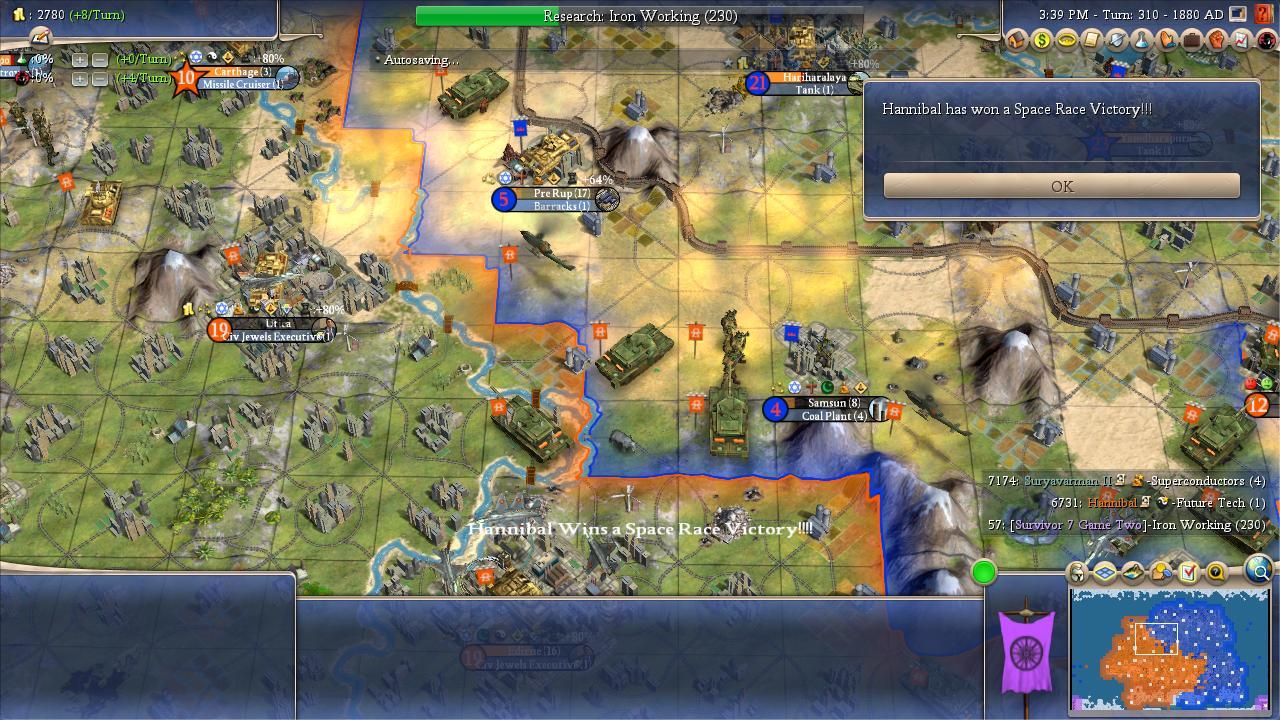
As for Suryavarman, he played an excellent game in his own right, a textbook example of how to snowball. He had a great starting location, leveraged it to get out to an early score lead, then hit one of his biggest threats - before said threat was ready for the attack - to cement his lead with little trouble. He was continuing the snowball through conquest of the other lesser nations before getting hit with an unusual situation that his programming couldn't account for, and that delay did prove enough to ensure he was passed by an equally impressive rival. Still, nobody else on this map had stood a chance against him, and on most maps this would have ended in a crushing victory. After an unimpressive outing last season, this was a triumphant return to form for Suryavarman - and his one guaranteed playoff rival so far is now Hammurabi, so maybe this was the result he wanted all along.
This game was as stark of a contrast from Game 1 as you could ask for. Instead of a long series of stalemates where nobody got too far ahead and a lot of unusual stuff happened, we got a brutally efficient pair of conquests as everybody else got swept away by the wave of Hannibal and Suryavarman. It was pretty easy to see where things were going as soon as Sury had crippled Mansa, leading to a less suspenseful game, but watching these two conquerors play so effectively was an enthralling spectacle of its own, and it will be interesting to see if they can keep their momentum in the playoff round. Thanks as always to all who make this tournament possible.



